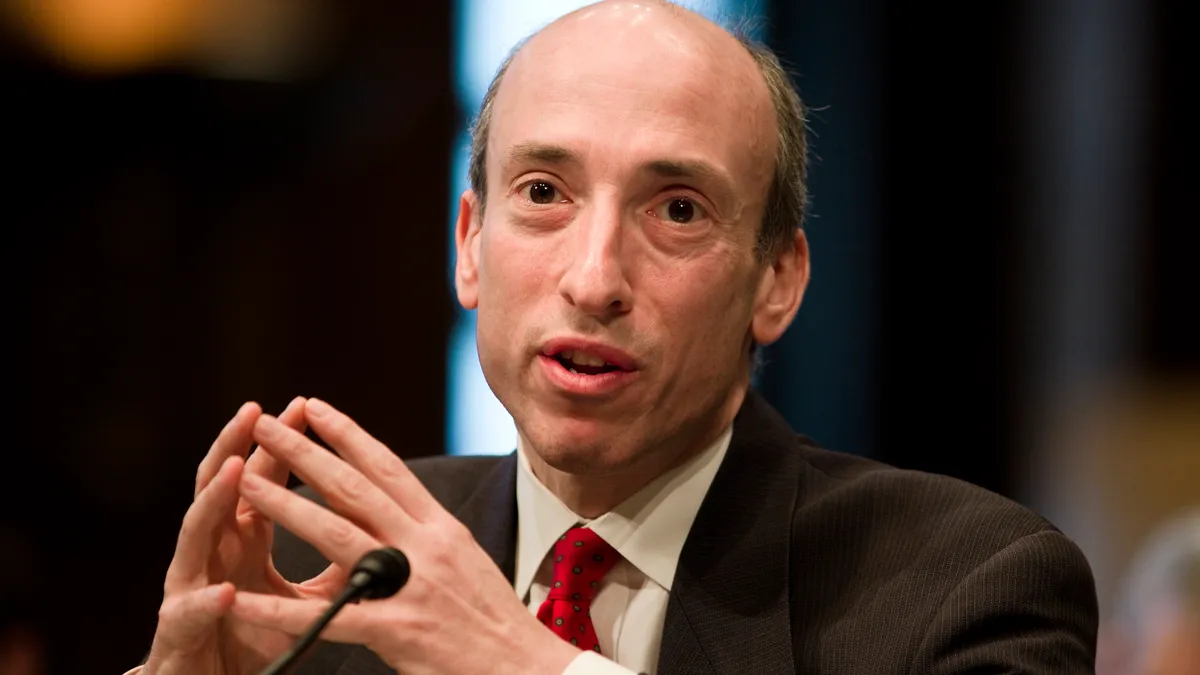Dive Brief:
- Securities and Exchange Commission Chair Gary Gensler on Thursday said that the agency aims to avoid exceeding its authority as it completes a proposed rule requiring companies to disclose their carbon emissions and the risks from climate change.
- Gensler faces criticism over a proposed requirement that companies, in addition to detailing their carbon emissions and those of their energy suppliers, estimate the so-called Scope 3 emissions by their suppliers and customers, Gensler said.
- “We did get a lot of feedback on that — that those estimates might then lead to the companies asking the supply chain for forms and numbers and everything like that,” Gensler said at the U.S. Chamber of Commerce. “So that’s why staff is looking through as to how we can ensure that we don’t indirectly sort of do what we can’t do directly — we don’t regulate nonpublic companies.”
Dive Insight:
The Scope 3 requirement, part of a climate risk disclosure rule proposed by the SEC in March 2022, has come under fire from business groups such as the chamber, Republican lawmakers and several state attorneys general.
The opponents say that by publishing a final regulation similar to its proposal, the SEC would overstep its authority and require companies to measure and disclose — at high cost — business details that are immaterial to investment decisions.
Investors want disclosure of Scope 3 emissions to gauge a company’s “transition risk,” or the potential for loss as the economy reduces dependence on fossil fuels, Gensler said.
At the same time, Gensler, referring to the Scope 3 mandate, said “we recognize it’s not as well developed in our proposal.”
The SEC is reviewing 16,000 letters commenting on the regulation, he said. It has repeatedly postponed release of a final rule.
Climate activists on Thursday pushed back against criticism that the SEC rule would impose onerous costs on companies.
Three out of four of Fortune 1000 companies would face no additional expense from having to disclose Scope 3 emissions and other data related to climate change, according to an analysis by Public Citizen, Sierra Club and Americans for Financial Reform Education Fund.
The companies would already have collected the information in order to comply with a California regulation signed into law this month, the groups said.
“The SEC’s final rule should recognize there are no additional compliance costs to disclose Scope 3 emissions for those already subject to California’s stringent measures,” the three climate activist groups said.
Companies must begin disclosing climate risks and carbon emissions under the California rule in 2026.
The regulation follows similar guidelines enacted by the European Union and the International Sustainability Standards Board, which is backed by the Group of 20 advanced and developing countries and the architects for global accounting rules.
The ISSB rules are voluntary and are intended as a standard for roughly 140 countries.
After enactment of the California regulation, 26 House Democrats representing the state said in an Oct. 12 letter to Gensler, “we strongly urge the commission to follow California’s lead and specifically include Scope 3 disclosure requirements.”
Scope 3 emissions data “is a key component to providing investors access to public companies’ climate-related financial opportunities and risks,” the lawmakers said.
“Without consistent and reliable Scope 3 data, investors will be limited in evaluating the management’s performance with respect to those risks and opportunities,” they said.














